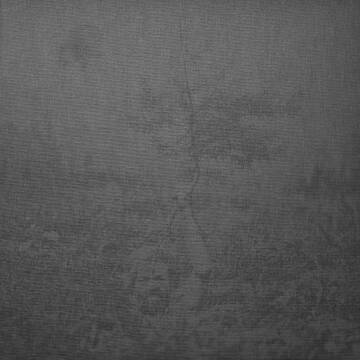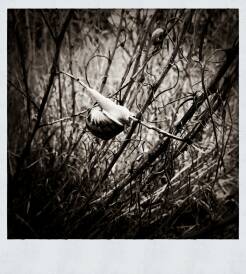KARCZEBY
by Adam Panczuk
Photographs: Adam Panczuk
Text: Kazimierz Kusznierow
Publisher: self-published
80 pages
Pictures: 23
Year: 2013
Comments: first edition of 550 copies including 50 collector's editions with print. size: 30 x 30 cm. design by Ania Nalecka /TBD
Karczebs
In one of the dialects spoken in the east of Poland, which is a mixture of Polish and Belorussian, people strongly attached to the soil they had been cultivating for generetations were called "Karczebs". With their bare hands Karczebs cleared forests in order to grow crops. The word Karczeb was also used to describe what remains after a tree is cut down - a trunk with roots, which remains stuck in the ground. This also applied to people - it was not easy for the authorities to root them out from their land, even in the Stalinism times. The price they paid for their attachment to their soil was often their freedom or life. After death, hurried nearby their farmland, a Karczeb himself became the soil, later cultivated by his descendants.
Awards:
Magnum Expression Award 1st Honorable Mention
National Geographic Photography Contest I prize in category Culture
Newsweek Poland Photo Awards II prize for picture story in category Culture
Grand Press Photo I prize for picture story in category People
Adam Panczuk is a member of the Sputnik Photos collective.
More books by Adam Panczuk
more books tagged »tradition« | >> see all
-
Once We Were Hunters
by Paul Weinberg
Euro 25 -
Petros Village
by Guy Tillim
Euro 132 -
Martin Parr in India 1984-2009 (signed)
by Martin Parr
sold out -
Wilder Mann
by Charles Fréger
sold out -
Pan India - A Shared Habitat (signed)
by Prashant Panjiar
Euro 44 -
Boiko (signed - review copy)
by Jan Brykczynski
Euro 49 39.20
more books tagged »black and white« | >> see all
-
Hundewege. Index eines konspirativen Alltags
by various photographers
sold out -
Poem as an Object # 4 (signed)
by Wypke Jannette Walen
Euro 17.50 -
DEEPER SHADES #02 TOKYO (book + print)
by Andreas H. Bitesnich
Euro 470 -
Wer sind Sie, Henri Cartier-Bresson?
by Henri Cartier-Bresson
Euro 60 -
People in Trouble Laughing Pushed to the Ground (signed - revi...
by Adam Broomberg & Oliver Chanarin
Euro 135 67.50 -
So Far (signed)
by Andreas H. Bitesnich
sold out
more books tagged »Eastern Europe« | >> see all
-
Kitchen Stories from the Balkans (signed - last copies)
by Eugenia Maximova
sold out -
Barricade (signed)
by Julia Polunina-But
sold out -
U
by Sputnik Photos
Euro 165 -
east
by Regina Maria Anzenberger
Euro 56 44.80 -
Ukraine
by Reiner Riedler
Euro 18 -
VINETA 1985/1990 (last copy)
by Andreas Trogisch
Euro 38.50
more books tagged »portrait« | >> see all
-
VOTE NO. 1 (special edition - signed - last copies)
by Mark Duffy
Euro 85 -
Grimaces of the weary village 1976 - 2001 (signed- last copy)
by Rimaldas Viksraitis
Euro 195 -
London Youth
by Julian Mährlein
Euro 24 -
The City of Brides (signed - last copy)
by Alena Zhandarova
Euro 250 -
Japan Coast (last copy)
by Silva Bingaz
Euro 38 -
Son and Bitch (signed - last copy)
by Ren Hang
Euro 2200
more books tagged »Polish« | >> see all
-
Woman with a Monkey (special edition + print - last copy)
by Justyna Mielnikiewicz
sold out -
HOUSE 2012/2013 (signed+print - last copies)
by Rafal Milach
Euro 110 -
Post-war Stories (last copy)
by Claudia Heinermann / Michael Iwanowski / Indre Serpytyte
Euro 75 -
The Winners (signed)
by Rafal Milach
sold out -
IS(not) (signed - last copies)
by Sputnik Photos
Euro 150 -
Platinum
by Waclaw Wantuch
sold out
Random selection from the Virtual bookshelf josefchladek.com
KARCZEBY
by Adam Panczuk
Photographs: Adam Panczuk
Text: Kazimierz Kusznierow
Publisher: self-published
80 pages
Pictures: 23
Year: 2013
Comments: first edition of 550 copies including 50 collector's editions with print. size: 30 x 30 cm. design by Ania Nalecka /TBD
Karczebs
In one of the dialects spoken in the east of Poland, which is a mixture of Polish and Belorussian, people strongly attached to the soil they had been cultivating for generetations were called "Karczebs". With their bare hands Karczebs cleared forests in order to grow crops. The word Karczeb was also used to describe what remains after a tree is cut down - a trunk with roots, which remains stuck in the ground. This also applied to people - it was not easy for the authorities to root them out from their land, even in the Stalinism times. The price they paid for their attachment to their soil was often their freedom or life. After death, hurried nearby their farmland, a Karczeb himself became the soil, later cultivated by his descendants.
Awards:
Magnum Expression Award 1st Honorable Mention
National Geographic Photography Contest I prize in category Culture
Newsweek Poland Photo Awards II prize for picture story in category Culture
Grand Press Photo I prize for picture story in category People
Adam Panczuk is a member of the Sputnik Photos collective.
More books by Adam Panczuk
more books tagged »tradition« | >> see all
-
Once We Were Hunters
by Paul Weinberg
Euro 25 -
Petros Village
by Guy Tillim
Euro 132 -
Martin Parr in India 1984-2009 (signed)
by Martin Parr
sold out -
Wilder Mann
by Charles Fréger
sold out -
Pan India - A Shared Habitat (signed)
by Prashant Panjiar
Euro 44 -
Boiko (signed - review copy)
by Jan Brykczynski
Euro 49 39.20
more books tagged »black and white« | >> see all
-
Hundewege. Index eines konspirativen Alltags
by various photographers
sold out -
Poem as an Object # 4 (signed)
by Wypke Jannette Walen
Euro 17.50 -
DEEPER SHADES #02 TOKYO (book + print)
by Andreas H. Bitesnich
Euro 470 -
Wer sind Sie, Henri Cartier-Bresson?
by Henri Cartier-Bresson
Euro 60 -
People in Trouble Laughing Pushed to the Ground (signed - revi...
by Adam Broomberg & Oliver Chanarin
Euro 135 67.50 -
So Far (signed)
by Andreas H. Bitesnich
sold out
more books tagged »Eastern Europe« | >> see all
-
Kitchen Stories from the Balkans (signed - last copies)
by Eugenia Maximova
sold out -
Barricade (signed)
by Julia Polunina-But
sold out -
U
by Sputnik Photos
Euro 165 -
east
by Regina Maria Anzenberger
Euro 56 44.80 -
Ukraine
by Reiner Riedler
Euro 18 -
VINETA 1985/1990 (last copy)
by Andreas Trogisch
Euro 38.50
more books tagged »portrait« | >> see all
-
VOTE NO. 1 (special edition - signed - last copies)
by Mark Duffy
Euro 85 -
Grimaces of the weary village 1976 - 2001 (signed- last copy)
by Rimaldas Viksraitis
Euro 195 -
London Youth
by Julian Mährlein
Euro 24 -
The City of Brides (signed - last copy)
by Alena Zhandarova
Euro 250 -
Japan Coast (last copy)
by Silva Bingaz
Euro 38 -
Son and Bitch (signed - last copy)
by Ren Hang
Euro 2200
more books tagged »Polish« | >> see all
-
Woman with a Monkey (special edition + print - last copy)
by Justyna Mielnikiewicz
sold out -
HOUSE 2012/2013 (signed+print - last copies)
by Rafal Milach
Euro 110 -
Post-war Stories (last copy)
by Claudia Heinermann / Michael Iwanowski / Indre Serpytyte
Euro 75 -
The Winners (signed)
by Rafal Milach
sold out -
IS(not) (signed - last copies)
by Sputnik Photos
Euro 150 -
Platinum
by Waclaw Wantuch
sold out
Random selection from the Virtual bookshelf josefchladek.com
KARCZEBY
by Adam Panczuk
Photographs: Adam Panczuk
Text: Kazimierz Kusznierow
Publisher: self-published
80 pages
Pictures: 23
Year: 2013
Comments: first edition of 550 copies including 50 collector's editions with print. size: 30 x 30 cm. design by Ania Nalecka /TBD
Karczebs
In one of the dialects spoken in the east of Poland, which is a mixture of Polish and Belorussian, people strongly attached to the soil they had been cultivating for generetations were called "Karczebs". With their bare hands Karczebs cleared forests in order to grow crops. The word Karczeb was also used to describe what remains after a tree is cut down - a trunk with roots, which remains stuck in the ground. This also applied to people - it was not easy for the authorities to root them out from their land, even in the Stalinism times. The price they paid for their attachment to their soil was often their freedom or life. After death, hurried nearby their farmland, a Karczeb himself became the soil, later cultivated by his descendants.
Awards:
Magnum Expression Award 1st Honorable Mention
National Geographic Photography Contest I prize in category Culture
Newsweek Poland Photo Awards II prize for picture story in category Culture
Grand Press Photo I prize for picture story in category People
Adam Panczuk is a member of the Sputnik Photos collective.
More books by Adam Panczuk
more books tagged »tradition« | >> see all
-
Once We Were Hunters
by Paul Weinberg
Euro 25 -
Petros Village
by Guy Tillim
Euro 132 -
Martin Parr in India 1984-2009 (signed)
by Martin Parr
sold out -
Wilder Mann
by Charles Fréger
sold out -
Pan India - A Shared Habitat (signed)
by Prashant Panjiar
Euro 44 -
Boiko (signed - review copy)
by Jan Brykczynski
Euro 49 39.20
more books tagged »black and white« | >> see all
-
Hundewege. Index eines konspirativen Alltags
by various photographers
sold out -
Poem as an Object # 4 (signed)
by Wypke Jannette Walen
Euro 17.50 -
DEEPER SHADES #02 TOKYO (book + print)
by Andreas H. Bitesnich
Euro 470 -
Wer sind Sie, Henri Cartier-Bresson?
by Henri Cartier-Bresson
Euro 60 -
People in Trouble Laughing Pushed to the Ground (signed - revi...
by Adam Broomberg & Oliver Chanarin
Euro 135 67.50 -
So Far (signed)
by Andreas H. Bitesnich
sold out
more books tagged »Eastern Europe« | >> see all
-
Kitchen Stories from the Balkans (signed - last copies)
by Eugenia Maximova
sold out -
Barricade (signed)
by Julia Polunina-But
sold out -
U
by Sputnik Photos
Euro 165 -
east
by Regina Maria Anzenberger
Euro 56 44.80 -
Ukraine
by Reiner Riedler
Euro 18 -
VINETA 1985/1990 (last copy)
by Andreas Trogisch
Euro 38.50
more books tagged »portrait« | >> see all
-
VOTE NO. 1 (special edition - signed - last copies)
by Mark Duffy
Euro 85 -
Grimaces of the weary village 1976 - 2001 (signed- last copy)
by Rimaldas Viksraitis
Euro 195 -
London Youth
by Julian Mährlein
Euro 24 -
The City of Brides (signed - last copy)
by Alena Zhandarova
Euro 250 -
Japan Coast (last copy)
by Silva Bingaz
Euro 38 -
Son and Bitch (signed - last copy)
by Ren Hang
Euro 2200
more books tagged »Polish« | >> see all
-
Woman with a Monkey (special edition + print - last copy)
by Justyna Mielnikiewicz
sold out -
HOUSE 2012/2013 (signed+print - last copies)
by Rafal Milach
Euro 110 -
Post-war Stories (last copy)
by Claudia Heinermann / Michael Iwanowski / Indre Serpytyte
Euro 75 -
The Winners (signed)
by Rafal Milach
sold out -
IS(not) (signed - last copies)
by Sputnik Photos
Euro 150 -
Platinum
by Waclaw Wantuch
sold out
Random selection from the Virtual bookshelf josefchladek.com










































_;jpg?c=5a6393e1d2fcdb1841462ed03a5edc61)



_(深瀬_昌久_遊戯_映像の現代4);jpg?c=f293bf65a03fab8901206b9c4e8e2738)




_-_guevara_shashinshu_-_che_(ゲバラ写真集_チェ_ブエノスの灯_編_年現代書館発行);jpg?c=5471bf503c6d5edba926307058db0c41)
_eisen._(bauen_in)_eisenbeton.;jpg?c=128039b474675fc2330f74a09f65b4bb)